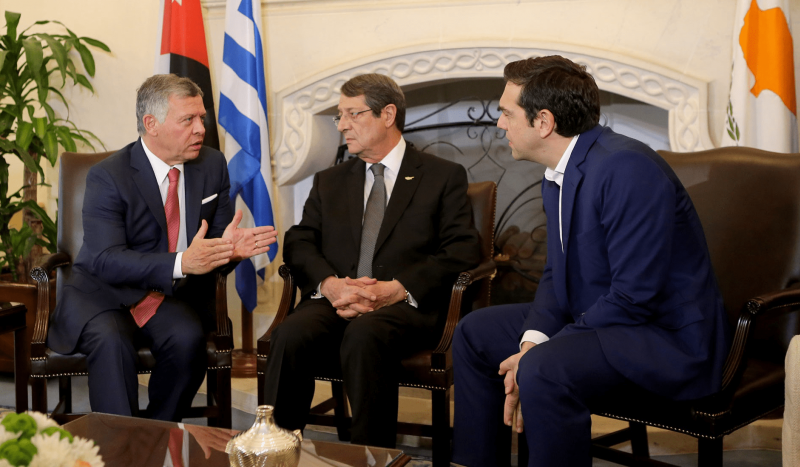King participates in trilateral summit with Cypriot president, Greek PM

His Majesty King Abdullah on Tuesday participated in a trilateral summit in Nicosia with Cypriot President Nicos Anastasiades and Greek Prime Minister Alexis Tsipras, which focused on ties among the three countries and current regional developments.
At the summit, the three sides affirmed the importance of building on the ties of friendship between Jordan, Cyprus, and Greece to cement a fruitful partnership that would expand cooperation in various areas and contribute to achieving peace, security, and stability in the region and the world.
Discussions at the summit, which continued over a working lunch, also touched on the Palestinian issue and Jerusalem, as well as regional crises and efforts to resolve them politically.
Talks also addressed regional and international efforts in the fight against terrorism within a holistic strategy.
The first session of the trilateral consultations covered cooperation among the three countries in enhancing trade exchange and investments, as well as in sectors such as renewable energy and energy efficiency, tourism, agriculture, maritime shipping—with Aqaba as a gateway into African markets, conservation of antiquities, and healthcare.
The session also covered the developments in the fight against terrorism.
The second session addressed Jordan’s relations with the EU and through the Union for the Mediterranean, developments related to the peace process, the conditions in Syria and Iraq, and the refugee and migrant crises.
In joint remarks to the press after the trilateral summit, King Abdullah stressed the importance of the meeting in advancing the Jordanian-Cypriot-Greek partnership, in the service of the three countries’ peoples and their region.
“Today marked the launch of what we hope will develop into a fruitful trilateral partnership that benefits all our peoples, and our wider region. We in Jordan are committed to cooperating in such vital fields as energy, water, agriculture, and tourism as were mentioned. And moreover, the agreements we are signing today will undoubtedly help us advance our ties even further,” the King noted.
“Creating partnerships between the private sectors of our three countries in these promising fields will provide jobs and opportunities for our peoples, and benefit our region by ensuring peaceful prosperity and synergy,” His Majesty added.
“It is no secret that we live in a very tough neighbourhood, rife with challenges, but also with opportunities; and together, our chances of capitalising on these opportunities and taking on these challenges increase tenfold,” the King said.
“During our very extensive and productive discussions today, we agreed to continue our cooperation within the framework of Jordan’s partnership with the European Union. And we look forward to working with Cyprus and Greece to benefit from the EU’s simplified rules of origin to enhance our national industries and increase our exports to Europe,” His Majesty added.
“In addition, our discussions today covered key global and regional issues. Jordan continues to support the efforts of the Government of the Republic of Cyprus to reach a comprehensive, just, lasting and viable solution to the Cyprus problem in accordance with UN Security Council resolutions and international law,” the King noted.
“As for the Middle East, there can be no peace; nor can there be stability without a just and permanent solution to the Palestinian-Israeli conflict, and Jerusalem is key to resolving it,” His Majesty asserted.
“The issue of Jerusalem must be settled within a comprehensive peace agreement based on the two-state solution that guarantees the establishment of an independent Palestinian state, with East Jerusalem as its capital, living side by side with Israel,” the King affirmed.
“No unilateral decision on Jerusalem will change the legal and historical facts or undermine the rights of Muslims and Christians to the holy city,” His Majesty continued.
“The Hashemite Custodianship of Jerusalem’s Islamic and Christian holy sites is a religious and historical responsibility that Jordan remains fully committed to. But the whole world has a vested interest in the responsibility towards Jerusalem and the Palestinian issue; we all have a stake in reaching peace, and avoiding the consequences of further escalation.
“And here, the European Union can contribute to efforts to bring Palestinians and Israelis to the negotiating table,” the King added.
“Jordan, Cyprus, and Greece are also committed to fighting the global terrorist and extremist threat within a holistic approach. To that end, Jordan, through the Aqaba Meetings, has been working to bring allies and stakeholders together to discuss how coordination can be improved to close off all avenues to terrorists and extremists around the world. And I, again, want to thank the role of Cyprus in this process,” His Majesty said.
“The victories achieved in Iraq against terrorism and the gains in Syria mark substantial progress in this fight; however, terrorist groups cannot be allowed to regroup and establish footholds elsewhere,” the King noted.
“For Syria, we affirm the importance of building on the Astana talks to reach a political solution through the Geneva process that maintains the country’s territorial integrity and fulfils the aspirations of the Syrian people,” His Majesty affirmed.
“And in the meantime, the plight of Syrian refugees remains an international concern, and host countries like Jordan need the world’s support. We are shouldering an immense refugee burden and cannot be left alone as we undertake this humanitarian responsibility on behalf of the world,” the King stressed.
His Majesty also thanked Cyprus and Greece for voicing Jordan’s challenges to the European Union and supporting the Kingdom in facing them.
“These are some of the issues that our countries will work closely on as we build this trilateral partnership, and we look forward to expanding on what has been agreed to today,” the King told reporters, voicing hope that the trilateral mechanism will continue with similar meetings in Amman or Athens.
In his remarks to the press, President Anastasiades said the exceptional relations and the bonds of friendship between the three countries provide the basis for taking this trilateral partnership forward.
Commenting on efforts to combat terrorism, the president praised Jordan’s role in hosting the Aqaba Meetings to contribute effectively to counterterrorism.
President Anastasiades also voiced Cyprus’ support for international efforts to revive the Middle East peace process, noting Jordan as a significant regional partner that can contribute towards this direction.
Praising Jordan’s humanitarian efforts to host a large number of Syrian refugees, he said Nicosia is aware of the burden this has brought on the Kingdom and noted his country’s efforts to voice this issue to the EU.
For his part, Prime Minister Tsipras highlighted the trilateral partnership’s strategic potential, noting the shared historical, cultural, and economic ties between the three countries.
Stressing Jordan’s immense refugee burden, he added that Greece and Cyprus are also on the frontline of the EU in receiving refugees.
Prime Minister Tsipras also voiced support for the Aqaba Meetings within the framework of fighting terrorism.
Turning to the Middle East peace process, he underlined the importance of the resumption of credible, immediate, direct talks to reach a two-state solution, with a Palestinian state living peacefully next to Israel, in the framework of the 1967 borders and with East Jerusalem as its capital.
The Greek prime minister also reaffirmed commitment to supporting the enhancement of cooperation between the European Union and Jordan, stressing the Kingdom’s important role as a pillar of stability and security in the region.
His Majesty, President Anastasiades, and Prime Minister Tsipras also witnessed the signing of a trilateral agreement on the protection of antiquities, and a memorandum of understanding on renewable energy.
Earlier on Tuesday, the King and the Cypriot president held a bilateral meeting, which was ollowed by an expanded meeting, on ties and regional developments.
Officials from the two countries also signed a number of bilateral agreements and memorandums of understanding.
In addition, His Majesty held a bilateral meeting with the Greek prime minister and discussed means to advance Jordanian-Greek ties, as well as regional developments.
The two countries signed an agreement on seafaring.
Prime Minister Hani Mulki, Royal Hashemite Court Chief Fayez Tarawneh, Foreign Minister Ayman Safadi, Planning Minister Imad Fakhoury, Energy Minister Saleh Kharabsheh, and Jordan’s ambassadors to Cyprus and Greece, Mohammad Al Fayez and Fawaz Al Eitan, attended the talks.
At the conclusion of the trilateral summit, a joint declaration was released, in which the three countries expressed commitment to building on their partnership to benefit their peoples and their wider region.
Jordan, Cyprus, and Greece also reaffirmed their support for a just and comprehensive solution to the Palestinian-Israeli conflict based on the two-state solution and in accordance with international law, relevant UN resolutions and the Arab Peace Initiative.
The status of Jerusalem must be determined within the framework of a comprehensive solution that guarantees the establishment of an independent Palestinian state on pre-June 1967 lines, with East Jerusalem as its capital, living side by side with Israel, the declaration said.
The declaration also highlighted Jordan’s constructive efforts towards peace and the Hashemite Custodianship over Jerusalem’s Islamic and Christian holy sites, also referencing the Kingdom’s strong ties with the EU and its efforts to serve refugees.
The three countries seek to expand cooperation in various fields, including energy, water, agriculture, aquaculture, tourism, maritime transport, ICT, and healthcare, according to the declaration, which said Jordan will host the next trilateral summit.


